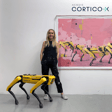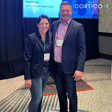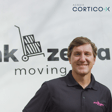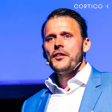Become a Creator today!Start creating today - Share your story with the world!
Start for free
00:00:00
00:00:01

Driving CX in the auto industry, with Jeff Curry and Len Devanna
We’ve all heard that old cliché, "It gets me from A to B." For a long period of time, that was good enough in the eyes of many drivers. How times have changed. The car industry is at the intersection of a range of disruptive forces: environmental sustainability, the rise of digital and AI, and the brand purpose era (to name a few).
There are few industries that are changing as rapidly, and as fundamentally, as automotive. To help Will understand the experience and brand implications of this new world behind the wheel, he is joined in this episode by Len Devanna, VP at Cortico-X, and Jeff Curry, former VP of Global Marketing, Communications and Product at Lucid Motors.
Get in touch with Cortico-X here.
Follow Cortico-X on LinkedIn here.
Transcript
Introduction to Cordico X and Episode Theme
00:00:00
Speaker
Cordico X is an experience-led transformation business that partners with clients and technology companies to drive digital acceleration. We are experience activists passionate about elevating everyday human experiences through the belief that what's best for people is what's best for an organization. Reach out to us for a chat. A link is in the show notes. so
00:00:34
Speaker
Hello and welcome to Speaking from Experience from CordicoX, where we speak to the people with experience of experience. I'm Will Kingston. We've all heard that old cliche, it gets me from A to B.
00:00:48
Speaker
For a long period of time, that was good enough in the eyes of many drivers. How times have changed.
The Evolving Car Industry and Technology Impact
00:00:54
Speaker
The car industry is at the intersection of a range of disruptive forces, environmental sustainability, the rise of digital and AI, and the brand purpose era to name just a few.
00:01:06
Speaker
In fact, there are a few industries that are changing as rapidly and as fundamentally as the automotive sector.
Meet the Experts: Linda Varna and Jeff Curry
00:01:12
Speaker
To help me understand the experience and brand implications of this new world behind the wheel, I'm delighted to be joined by Linda Varna, VP at Cortico X and Jeff Curry, former VP of global marketing communications and product at Lucid Motors.
00:01:29
Speaker
Geoff, I'll start with you and I apologise in advance for what will be the first of many car puns in this interview. Tell me about your journey in automotive.
Jeff Curry's Automotive Career Journey
00:01:40
Speaker
Well, you know, it's a long one actually. Well, it really began as a little kid crawling around a dealership in rural Indiana, you know, and and smelling those new car smells and the smells of a Chevy dealer and and in service and, you know, with my grandfather and and family. And so kind of grew up around that had no idea I'd pursue a passion for cars eventually on in my career and.
00:02:03
Speaker
Eventually thought i'd be a diplomat went to georgetown in dc and was gonna go into the foreign service but you know luckily i was i was saved in and became a PR person for land rover and help tell the story and i grow the whole idea of a luxury SUV market which didn't even exist back in the day when the land of the dinosaurs when i'm talking about now back in the,
00:02:24
Speaker
in the early early to mid-90s and introduced the full Land Rover brand to the US. and and Then it was a ah wild ride in the car industry and going from PR to product planning, working in UK, working in Germany, and and really getting the full gamut of PR marketing and product planning. you know Background very early on in my career, which I feel extremely lucky to have, and being able to work on that scale as um as one of the only Americans in an industry you know overseas was a really pivotal thing. and Kind of parlay that into you know continuing on in the car business and then interrupted over time by some start some stops at startups which was really you know a leap of faith and going into a startup called xm radio which was back in the day where there was no streaming audio there was no paid digital music.
00:03:17
Speaker
you know which we all pay for today and probably in multiple places. But it was really this idea of getting people to pay for an incredible entertainment and music and then getting that tech embedded into all the new cars, millions of new cars, ah which hadn't been done before in such a short
Lucid Motors: Innovation and Luxury in EVs
00:03:32
Speaker
time. So it was this crazy introduction to the world of startups that got me addicted to that dynamic and that way of working that you only get in startups where you've got this like-minded team rowing so fast in the same direction and trying to create something really new and i've had been fortunate to have that experience a couple times in my career not just in satellite radio but then eventually an electric vehicle infrastructure and then you know culminating in where i met mr davana is the time we spent together at lucid motors which is kind of the ultimate startup where you get to start a ah brand new car brand in the scale and ambition and
00:04:09
Speaker
and risk and the and the the amount of money and and investment involved in and doing that to create a the great next great new luxury car brand around incredible EV technology. A lot of other stops along the way at Audi and Ferrari and Jaguar Land River, maybe we can talk a little bit about that later, but yeah i'm I'm glad to be here. It's great to join and thanks for giving me a second to just zip through a little bit of background.
00:04:37
Speaker
We will get to those. ah' Maybe just to pick up on what is a really fascinating element or a really fascinating feature of that story, which is the combination of startup world and then really established wonderful car brands.
Lessons from Legacy and Startups
00:04:51
Speaker
Talk me through, I guess, the mindset that you need to bring to each of those and maybe what are the key differences in it approaching a role in startup world in in automotive compared to with say a Jaguar and Audi.
00:05:03
Speaker
Yeah, absolutely. I you know i think these these legacy brands that have been around a long time could really benefit often and is what I find by a bit of that dose of ah the startup way of working and that kind of mindset and being able to deal with ambiguity and ah Deal deal and have that resilience to keep going ah against a lot of obstacles and to just work smarter faster to be scrappy do a lot with a little instead of a little with a lot which is what a lot of car companies have tended to do overtime. And you know so i think anyone who has the chance to make us make a stop at a startup and and spend some time there kind of learning will really supercharge their career because the pace that you learn to work.
00:05:46
Speaker
and the way that you learn to deal and and to do so many things at once and juggle so many balls, and and Len knows this from our time at at Lucid. And also, you get to do you get to do a lot often early in your career, and and that experience is invaluable, even when they're not always successes.
00:06:05
Speaker
because you learn a lot from the failures too so i think this this the startup and then the pollination of kind of that way of working into legacy brands and conversely what i learned a legacy brands of the quality of execution and the in the way of doing things in a in a process where the results in great business and making money.
00:06:25
Speaker
all of those great things about ah an established brand and building a heritage and ah and a lasting and enduring and loyal fan base and a great customer journey. All those things port but right back into startups too. So there's this the synergy and and and melding I think of the best of both that I didn't realize it as you go along the journey, but that's really been what I've developed and as part of my career intentionally or not. and I think that's what has you know helped me and and be successful in different roles and and meet great folks like Len along the way too. Len, you've also spanned both iconic brands as well as startup. Well, tell me a bit about your journey.
00:07:05
Speaker
Yeah. So i I had a passion for cars early on, but much like Jeff, right? His kids were all playing with our match boxes or whatnot, or crawling around with our remote ah control cars. But I think my passion really ignited in 2015. That was when I picked up my first electric car. And that was just mind blowing for me. That changed everything.
00:07:25
Speaker
not only from a ah sustainable mobility perspective, but the thrill of the drive was different. Everything about it was different. But for me as an experienced person, what was really different, and what really caught my attention was the buying experience. I was used to haggling, and we'll talk more about this, I'm sure, but haggling and you know going to multiple dealers and spending countless hours trying to figure out the next purchase price or your purchase price trying to negotiate. And when all of a sudden There's a new experience where there's a price and you click a button and you can get a car and it was just a game changer for me. So I would say that that my first electric was a Tesla. That was really what ignited my passion.
00:08:04
Speaker
And then I was very, very thankful to get a call from from Lucid and Jeff in 2021, 2020 ish. And I was just absolutely delighted to bring my my passion for experience and my passion for automotive to Lucid as a startup. And what's interesting to me, just to touch on it, is ah in a hindsight, especially I applaud what Lucid did in in bringing in talent from the outside world for those that that I that don't know.
00:08:31
Speaker
about half my career client side, half my career in consulting. I've had the the absolute fortune of of helping brands like Apple and Starbucks and Google and Microsoft and and yada, yada, yada. But in looking outside the category, Lucid brought in fresh thinking.
00:08:46
Speaker
And I think today the stat is 82% of brands really start by looking at industry experience.
Reimagining Customer Experience in Automotive
00:08:52
Speaker
Are you relevant? Do you feel like us as their initial step in hiring? And I think that's a giant mistake. Had Lucid just gone off and hired a bunch of direct to consumer electric car people, they would have built another Tesla. And that wasn't the point.
00:09:06
Speaker
Well, you mentioned that Lucid's doing some really interesting disruptive things and we'll get to what those are in a moment, but I think that's probably a promising question before that, which is why does the automotive industry need to be disrupted? What are those areas that need to actually be to be addressed? And Len, I'll stick with you for that one.
00:09:26
Speaker
Sure. And i'll I'll defer to Jeff to keep you honest here. But what's what's interesting is we all have to step back and and understand the model that is in place. And we affectionately, affectionately, we refer to it as the dealer network model. And, you know, said simply the the OEM, the original equipment manufacturer, sells cars, but they don't really sell cars to the consumer. They sell cars to car dealers and then car dealers sell to the consumer.
00:09:50
Speaker
So the brand is is a step removed at a minimum from from their buyer. And the the implications there are enormous. If you think about buying from a traditional manufacturer, as you're in the discover phase of your journey, you might get local advertising. You might get national advertising. Heck, you might be even be exposed to global advertising. So right out of the gate, you could have three different voices shouting at you.
00:10:16
Speaker
As you go to consider and purchase the vehicle, I think the average consumer goes to 3.2 dealerships in the interest of negotiating the best price. That is insane to me. And while it's a crude analogy, imagine if we had to go to three different targets to get the best price on eggs or milk. Now that is insanity. Why are you putting the onus on the consumer? You know, that that violates every fundamental business principle I have in me. And then if you had sort of teased this thing out,
00:10:44
Speaker
and Think about it i go to the transaction i might deal with your financial services i might deal with my bank i might do someone else and then services servicing my car again i'm probably going to multiple dealers trying to find the best value for my money. That is a college experience there are hundreds of hands in it and at the end of the day. The brand that made the car doesn't control that experience.
00:11:06
Speaker
They are at least a step or removed and that at its very core and there's dozens of other reasons. So I suspect jeff Jeff will touch on some as well. But at its very core, getting control of the customer experience is the primary reason I see the need for OEMs to reinvent.
00:11:23
Speaker
Yeah, and I'll just add to that a little bit. you know I spent a lot of time at brands that had dealer networks that are independent, each one in an independent business in their own right and and often highly successful, usually highly successful businesses.
00:11:39
Speaker
and really active in their communities and there is a locality element to this like you know your dealer you know your neighbor you know who takes care of you in your car so there's there's so many good things also about having.
00:11:55
Speaker
a familiar face to take care of you with such an important purchase. and That's what I really learned about that the goodness of the of the best dealers and the great dealers who are out there to really take care of their customers. and The model can work if you have a whole system of those kinds of dealers. But unfortunately, they're not always in that same ballpark or camp and they're because they are independent businesses. and so It's a ah constant dialogue between the OEM, the carmen the car brand who has a dealer franchise network, and the dealers on having those standards. What are those standards that are enabling you to have that consistency across the customer journey? How do you account for the different systems that a dealer might have versus the car company might have? and and and Especially in this digital era, those systems inevitably weren't synchronized and linked and
00:12:51
Speaker
doing this communications at the same time. So you end up with this this customer journey that on paper, you can map out a fantastic one. But when it comes down to the reality of it, having a direct-to-consumer network, highly expensive, a lot of ah lot of investment that's required to do that for ah for a new brand, a new automotive brand,
00:13:13
Speaker
But you get much more of that control that Lynn's talking about and that consistency potentially. But on the other hand, you know you you also miss out somewhat on those those local ah people who have been in the community for so long and have taken care of the service and and the customers and that loyalty.
OEMs and Dealer Networks: Challenges and Opportunities
00:13:31
Speaker
So you know there's there's there's a way to bridge this, I think, that is very smart and that's going to require, and it's actually great that there's so much new technology that is coming now that can allow us to, even in ah in a jointly owned customer journey, start to fill those gaps.
00:13:49
Speaker
and stitch together those those pieces of the quilt, if you will, that might be missing and you start to to to put something in place here that that is executed by the car company level or something over here that's done by the dealer. But you do it in a coordinated way and that's hard and it requires a lot of effort and work both on this the standpoint of the car companies as well as on the ah from the dealers themselves too and all of their teams. so you know In some ways it's a much harder thing, but I think now more than ever, there's the opportunity for these for for car brands that have dealer franchise networks to work so cohesively together and use new tools, use new systems, use things like AI. and But everyone has to become conversant in these technologies so and they have to know and they have to be on the same page. And and as much as you have you're communicating with customers as a marketer at a car company, you're also partnering and communicating with dealers.
00:14:46
Speaker
too it's It's your other main consistency. and you know Maybe at a startup, another big consistency is your investors because you're you're also trying to raise a lot of money, but each one of these types of of car companies in business have their own complexities.
00:14:59
Speaker
yeah just well I'll play off Jeff's point briefly. the You and I practice and preach this every day. how do How do brands put the customer in the DNA of the business? How do you move to a model of customer centricity? Jeff touched on all sorts of things. There's culture, there's technology, there's infrastructure, yada, yada. But at the end of the day, and it's Jeff's point, the model can work. The dealer network model can work. But the question will be, how do you inject the customer centricity in a distributed model?
00:15:28
Speaker
Fascinating. And I think something which may surprise a lot of people is to have an ecosystem mindset as a car manufacturer, as opposed to just thinking about it as ah as a direct relationship with your customer. And that obviously adds a great deal of complexity. Let's hone in on one specific part of the ecosystem though, and that is the manufacturer. What do you think some of the big headwinds are that traditional manufacturers will face and are facing as they evolve to meet the needs of modern consumers?
00:15:58
Speaker
Yeah, I think there's a couple of things. First, on the product side, you know the the needs of the consumer for different types of products you know are are definitely shifting and constantly evolving. And the impact of things like government regulation, ah new governments, and new policies coming into place.
00:16:15
Speaker
ah Certainly the global competition and ah the rise of you know of countries like China as such as the biggest automotive you know market in the world and and so many new brands coming there and and then like the competition to to really compete on a product level with how quickly ah you know brands from from China have have come into their own right and onto a global stage. And you see this happening in Europe in real time right now.
00:16:44
Speaker
ah you know with with the tariffs now being levied against some ah Chinese imports to try to ah protect the you know really important home markets there for automotive brands. And I think the key thing is how quickly can you know the the established car makers you know adapt. and And to be fair, they're they've been moving very fast for car companies.
00:17:05
Speaker
you know for for established car companies to introduce electric vehicles and their own take on evs unfortunately there you know often first efforts and you know and and out of the gate there's a big learning curve to making an electric vehicle versus you know when you're still focused on producing huge ranges of other types of vehicles a lot of companies have gotten it ah much better than others.
00:17:28
Speaker
and And they're the ones that are being more successful in the marketplace today, particularly you know brands you know and in that in the Hyundai group and and you see some others that are that are being highly successful in this and this transition. But I think there's there's another dynamic that is still to play out here and that's the consumer.
00:17:46
Speaker
what does the consumer really want? and Ultimately, they're the decider. right They're the ones spending spending the money and are going to decide, what are the most compelling products? What am I willing to spend my money on? and They're not just thinking about the powertrain. They're thinking ah about the whole thing. The car is this most emotional kind of purchase maybe outside of your house that you can you can ever do where you live and where you drive. Those are the things. and and and I think it's going to push the entire industry to produce more compelling products, a much more, even more emphasis on design and the fit and finish and the quality and the technology and software defined vehicles. And certainly this differentiation, which we really focused on at Lucid, of what is the best EV technology in the world?
Consumer Behavior and Marketing Strategies
00:18:36
Speaker
Because it's just at its infancy and there's so much more advancement that can happen in the core technology, in the efficiency,
00:18:43
Speaker
of the complete electric powertrain and the motors and the drivetrain and the batteries and the power electronics and and the charging and the charging network. you know so there's I would just say it's it's it the most exciting and challenging time simultaneously to be in the auto industry with all of these competing external factors and politics and everything else coming into play.
00:19:07
Speaker
the ability to produce new products much more quickly, new powertrain and new choices, and consumers trying to make sense of all this. And as a marketer, that's our job to help them figure this out and to show them for the brands we're working with and for why we're the best, why we deserve to be a famous brand, and why they should choose our products.
00:19:29
Speaker
Pretty much everything you've said there relies on having really strong customer understanding. When you think about that customer insights piece to be able to enable you understand consumers in automotive, what are some principles that you live by? And perhaps what are some things around customer understanding that unique or more unique to to the automotive sector?
00:19:53
Speaker
Yeah, I think, you know, I always think of my job as a marketer is to be the closest to the consumer. I need a mind meld with our customer target to understand what else are they doing in their lives? Because they're not just sitting around thinking about their car all day.
00:20:09
Speaker
right They're going about their daily lives and and they're consuming other products and other categories whether they're traveling or they're going to a restaurant or they're listening to music or they're buying fashion. you know and and that Especially in the luxury space, that's my role is to to understand that whole world that they inhabit and to be an expert in it.
00:20:28
Speaker
and the influences from pop culture that are constantly shifting and changing and and the influences of things from ah social media that constantly influence our culture too. And if you don't have your hand ah your finger on the pulse of all of those things simultaneously, which sounds impossible,
00:20:45
Speaker
But you have to have an instinctual ability, I think, to constantly consume a ton of information where your customers are are living and working and dining and and consuming. And then you have to parse that on the fly to help position your brand, your products in the best possible way so you meet the consumer where they are. So I think your question is spot on that.
00:21:10
Speaker
that innate understanding of the customer at at such a detailed level, which sounds crazy. you know You're managing a big marketing team or ah you know and you're dealing with all these other factors, but you got to know this down to the detail. and I think that's the challenge for for CMOs and marketers you know today. and and you know and and Building that that customer journey, we can do that in a vacuum, but it has to be in fitting into their lives, not just what we want.
00:21:37
Speaker
And that's really where I think the work that Len did on on so much of the things that Lucid really um really helped us come to life to. Well, that's a nice segue then, Len. Let's go to you first. How are brands like Lucid and Tesla disrupting the status quo? How are they changing that customer journey? I'll focus on Lucid only only because as a Tesla buyer a couple of times, I don't see the experience as being on par with what it could be.
00:22:04
Speaker
But you know me well enough to know that customer centricity is everything. And if I go back to my time at Lucid with Jeff, our rally cry to the business was that exceptional products had to be complemented by equally as exceptional experiences.
00:22:20
Speaker
Bullstop. And Lucidair is undoubtedly an exceptional product. And Jeff touched on some of the reasons why. But we talked about the challenges for OEMs. We talked about the opportunity for up and comers. And one of the differences to your question, well, is at Lucid, we were able to step back and literally whiteboard the customer experience from start to finish.
00:22:42
Speaker
Which is, especially in hindsight, you don't realize how powerful that is. The OEMs have to deconstruct everything, reconstruct everything. There's politics, there's organizational complexities. That's really hard. But we were able to design from the ground up a purpose-built experience. And I can't speak for Lucent today because I haven't haven't walked the halls there in about a year or so.
00:23:04
Speaker
But certainly at the time, and I suspect to this day, if you were a buyer who wanted a high touch white glove experience at every point in the journey, we got you covered. If you were a buyer who wanted to go on a website, buy a car, and only have a human interaction when the keys were handed off to you and to sign the final paperwork, we got you covered. You want something in the middle? We got that too. So it was, I think, loose. It stands out as a company that built from the ground up, at its very foundation, customer-centric experiences that catered to the needs of the buyer. And I think that's the secret sauce that OEMs have to figure out in in the coming years, but it's ah it's a tremendously exciting thing to be a part of.
00:23:49
Speaker
Talked a lot about disrupting the product we've talked a lot about changing the experience there's another lens here and that is changing how we think about brand now I would be remiss not to bring up a contentious rebrand from jaguar which has received a lot of media attention in the last twenty four hours.
00:24:09
Speaker
Jeff, I'll go to you.
Brand Evolution in a Disruptive Market
00:24:10
Speaker
What's your reflections on on perhaps the Jaguar case study specifically, and then more generally, how you should be thinking about brand in the this new disruptive age? Yeah. and you know Let me start off at you know with this reflection by saying I have this huge affinity for British brands. I'm a bit of an anglophile. I lived there for a bit and started my career at Land Rover and then returned to the fold with when I worked for the then the JLR, Jaguar Land Rover, and was the you know the person responsible for the Jaguar business in in North America. And you know during that time, you know we were on a real that mission to resurrect
00:24:54
Speaker
the the company and make it a real challenger brand to the to the the the brands that were doing so well at that time like Audi and BMW and Lexus and others and to really present a ah real British ah alternative steeped in everything that was great about British culture and you know we had ah a brand new sports car called the f type a brand new SUV that still gorgeous looks great called the f pace and some of the best designed and engineer cars in the world and they were they were you know all new on the lineup tremendous investment.
00:25:28
Speaker
But the product alone can't do the work and you know we reintroduce the brand with this this campaign that i did call british villains which is this idea that. In hollywood movies all the best villains we love the hate or we love the love are ah played by brits typically and we cast.
00:25:46
Speaker
ah Mark Strong and Sir Ben Kingsley and Tom Hiddleston, Loki, in this incredible film that we did with Tom Hooper. and and The music was by Alexander Desplat. We basically created a ah movie based on this idea of British villains. and Of course, filmed it all on location in London and even did the score in Abbey Road. and you know it was um and We put it on the Super Bowl. It really broke through at the time. I watched it this morning. It is phenomenal.
00:26:14
Speaker
Yeah, it really holds up you know because of the quality and caliber, but it took a tremendous investment. but it shows and And at the time, the conversation level, I actually sent ah a text to a friend at JLR this morning saying,
00:26:29
Speaker
think the The conversation level around the the Jaguar rebrand, which is kind of the the new topic here that's, and that is so much controversy, you know, really ah only during the Super Bowl did we ever have that much conversation and traffic about the brand and bringing a British brand to the biggest game in the world. and It was the right strategy at the time you know to do the Super Bowl and the brand. and it and It was a big success, but you know unfortunately, the company you know had other priorities too. Many mouths to feed and and couldn't sustain that level of investment to pay off really the new products in their first EV. They're very early with the I-PACE, with an electric car and developing all these great products. so it It's a fascinating multi-dimensional case study of what didn't go well then.
00:27:12
Speaker
If you fast forward to where they're at today, you know there's this fundamental reset they're doing with with the brand, you know going dark essentially with no products in the market, and then reintroducing it in a higher level position in the marketplace, which makes sense from ah maybe from a ah potential for profitability and to really be more on that same garage as a Range Rover owner with a Jaguar you know kind of in that $100, $150,000 price range. We'll see what the product looks like.
00:27:41
Speaker
Look, there's so many smart people at Jaguar Land Rover and they're highly successful in so many ways. They know how to develop incredible products. My concern is you know the balance of how they've gone about doing this. And and to me, you always I always think of product design and development as this, this process where the marketing and the communication and the advertising and, and all of the creative that the consumer see is the final layer of developing a world-class great product. It's not, you develop the product and then you to throw it over here and see what you can do. If you're not developing it all in context and in kind, you're not doing it right to me. And you haven't completed that the development of a great product.
00:28:23
Speaker
I think they're fixing things that weren't broken, like the brand and the identity. And and they're they're you know not focusing first on the things that maybe could be fixed more easily and and and weren't as good, like introducing this incredible new product that they're promising. And nothing would make me happier than to see a stellar product roll out in a couple of weeks. I think they're doing this at at art Art Week in Miami to introduce the car. and Look, it's going to be a big, bold change in the product, and I have no doubt they're going to introduce something really ah interesting and compelling. But why set it up with this this this first story being how we're changing the identity, and then a fashion, maybe inspired, you know I think it's like a little bit like Jack-o-mas-aping kind of you know movie and film around it that that promises it's a copy of nothing.
00:29:21
Speaker
but we've all seen images like that before in fashion. and it's not it's not going to It's not setting the car up in the proper way is my is my fear. and i I hope I'm completely wrong. I actually said this to my my friend and he was there now and calling, I said, I hope I'm 100 percent wrong and I would love it if I am. and Because the car now has to be so stellar that it makes us forget all that.
00:29:49
Speaker
At least we're talking about it. that's the That's the opportunity they have now is take all this conversation and and make it something big and quickly get past the controversy and focus on the product. Len, let's look
Reinventing the Automotive Industry
00:30:05
Speaker
ahead. What interesting trends do you see in automotive through the lens of CX going forward? I think it's an industry that is under reinvention. and We've touched on it. I think it's one of the it's an industry that has arguably one of the biggest opportunities ahead of it. um And having is just a fraction of time in the category that Jeff has, ah there is a little more exciting than re-imagining an entire category.
00:30:30
Speaker
So i just being a part of that movement and watching it and and helping shape it has been extremely fulfilling. I think we have a lot to to look forward to. The the Jaguar announcement yesterday they talked about reimagining their buying experience. So this is top of mind for them. If you look at brands like Hyundai, they are selling cars on Amazon now. that is you know If you told me that 10 years ago, I would have laughed at you.
00:30:53
Speaker
But the industry knows it needs to reimagine itself. They are actively doing it. The question I have is, can they truly deconstruct very established models, processes, systems, and technologies, tech stacks? yeah can they Can they successfully pull that down and rebuild how they go to market through the lens of the customer? And that'll be one of the most exciting things we get to watch in the next five years.
00:31:20
Speaker
And Jeff, I'll slightly tweak that question for what will be my final question.
Adapting to Change: Advice for Leaders
00:31:24
Speaker
And that is given all of the disruption that we're talking about, given that there are some now very well-publicized risks, both from a brand perspective of of what happens when you, when you reimagine something in a way which may not be expected in the marketplace. What advice would you be giving to a marketing leader in the automotive sector who's looking to navigate this new wave of disruption that we're seeing in the industry?
00:31:50
Speaker
Well, I would say you've got to, you've got to have an open mind and you got to be willing to change and adjust and shift on the fly. You got to be super nimble. And it again, it goes back to all those principles that I just learned and are kind of inherent in how I like to work it from a startup. and And you have to be willing to take some risks, know some of them won't pay off, but, but also measure the risks you're taking. And you know, so that, that if they don't pay off,
00:32:17
Speaker
you quickly adjust and you move on to the things that you know will work or that you figure out will work. and I think there's also a, you need to have a much more open brand mindset where you're working with other like-minded brands or brands that ah need something from you. Maybe you can get a little something from collaborating with them and constantly looking and assessing ah those partnerships because new brands are coming on board all the time, particularly in faster smoothing categories like fashion or music or art or entertainment and and all of those things can have a big impact they also have a big risk if you put yourself with the wrong kind of if you put yourself at the wrong kinds of brand or or product or influence or entertainer.
00:33:01
Speaker
So I think it's so much instinctual. Hone your instincts, know your audience, keep tabs of culture and embed yourself in that culture and where your customers are constantly and don't become complacent in it. Also, it'll help keep you young or younger as possible if you can stay connected to what's fresh and new and and coming out and you know you and i think then use the new tools that we have coming our way don't be afraid of them. I am so excited about the the use of of tools like a and you know especially being able to use the kind of the cloud based technologies that we build it lucid from the ground up and.
00:33:40
Speaker
through lens leadership and building the marketing tech stack that that powered our growth engine and enabled analytics down to the penny of what we were spending and getting out of it. Every company should have that, but they don't. And we we had the advantage of building that from scratch ah and a clean slate at Lucid, but it gave us that that insight where the CFO or the manager and the rest of the executive leadership, I could show them you know what we were spending, what we were getting out of it through the growth team. and and you know I think those tools, those those digital tools, we all as marketers, if you don't embrace them and understand them, you don't have to know how to develop them, but you have to understand them and what they can do for you as a business, for the brand and what they most importantly can deliver to your customers or your dealer partners and and and and ultimately how they can deliver this incredible customer journey that and I know I learned so much from Len about and and became passionate about too.
00:34:38
Speaker
Len, Jeff, thank you for coming on Speaking From Experience. Thanks for having us. Thanks, Will. Cheers. Thank you very much for listening to this episode of Speaking From Experience. If you enjoyed the show, please leave us a rating and a review. And if you really enjoyed the show, reach out to us for a chat. A link is in the show notes.



















